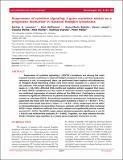| dc.contributor.author | Lennerz, Jochen K. | en_US |
| dc.contributor.author | Hoffmann, Karl | en_US |
| dc.contributor.author | Bubolz, Anna-Maria | en_US |
| dc.contributor.author | Lessel, Davor | en_US |
| dc.contributor.author | Welke, Claudia | en_US |
| dc.contributor.author | Rüther, Nele | en_US |
| dc.contributor.author | Viardot, Andreas | en_US |
| dc.contributor.author | Möller, Peter | en_US |
| dc.date.accessioned | 2016-03-01T19:49:12Z | |
| dc.date.issued | 2015 | en_US |
| dc.identifier.citation | Lennerz, Jochen K., Karl Hoffmann, Anna-Maria Bubolz, Davor Lessel, Claudia Welke, Nele Rüther, Andreas Viardot, and Peter Möller. 2015. “Suppressor of cytokine signaling 1 gene mutation status as a prognostic biomarker in classical Hodgkin lymphoma.” Oncotarget 6 (30): 29097-29110. | en |
| dc.identifier.issn | 1949-2553 | en |
| dc.identifier.uri | http://nrs.harvard.edu/urn-3:HUL.InstRepos:25658382 | |
| dc.description.abstract | Suppressor of cytokine signaling 1 (SOCS1) mutations are among the most frequent somatic mutations in classical Hodgkin lymphoma (cHL), yet their prognostic relevance in cHL is unexplored. Here, we performed laser-capture microdissection of Hodgkin/Reed-Sternberg (HRS) cells from tumor samples in a cohort of 105 cHL patients. Full-length SOCS1 gene sequencing showed mutations in 61% of all cases (n = 64/105). Affected DNA-motifs and mutation pattern suggest that many of these SOCS1 mutations are the result of aberrant somatic hypermutation and we confirmed expression of mutant alleles at the RNA level. Contingency analysis showed no significant differences of patient-characteristics with HRS-cells containing mutant vs. wild-type SOCS1. By predicted mutational consequence, mutations can be separated into those with non-truncating point mutations (‘minor’ n = 49/64 = 77%) and those with length alteration (‘major’; n = 15/64 = 23%). Subgroups did not differ in clinicopathological characteristics; however, patients with HRS-cells that contained SOCS1 major mutations suffered from early relapse and significantly shorter overall survival (P = 0.03). The SOCS1 major status retained prognostic significance in uni-(P = 0.016) and multivariate analyses (P = 0.005). Together, our data indicate that the SOCS1 mutation type qualifies as a single-gene prognostic biomarker in cHL. | en |
| dc.language.iso | en_US | en |
| dc.publisher | Impact Journals LLC | en |
| dc.relation.hasversion | http://www.ncbi.nlm.nih.gov/pmc/articles/PMC4745714/pdf/ | en |
| dash.license | LAA | en_US |
| dc.subject | SOCS1 | en |
| dc.subject | Hodgkin lymphoma | en |
| dc.subject | cHL | en |
| dc.subject | prognostic biomarker | en |
| dc.title | Suppressor of cytokine signaling 1 gene mutation status as a prognostic biomarker in classical Hodgkin lymphoma | en |
| dc.type | Journal Article | en_US |
| dc.description.version | Version of Record | en |
| dc.relation.journal | Oncotarget | en |
| dash.depositing.author | Lennerz, Jochen K. | en_US |
| dc.date.available | 2016-03-01T19:49:12Z | |
| dash.contributor.affiliated | Lennerz, Jochen | |


